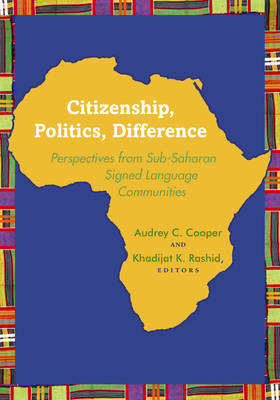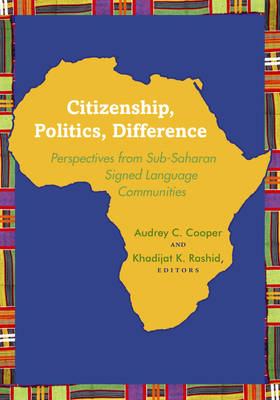
- Retrait gratuit dans votre magasin Club
- 7.000.000 titres dans notre catalogue
- Payer en toute sécurité
- Toujours un magasin près de chez vous
- Retrait gratuit dans votre magasin Club
- 7.000.000 titres dans notre catalogue
- Payer en toute sécurité
- Toujours un magasin près de chez vous
Citizenship, Politics, Difference
Perspectives from Sub-Saharan Signed Language Communities
Audrey C. Cooper
Livre relié | Anglais
83,95 €
+ 167 points
Description
Sub-Saharan Africa is one of the most linguistically, culturally, and geographically diverse regions of the world, home to more than 2,000 languages. As in the rest of the world, Deaf people live throughout the widely varying sub-Saharan communities, equally rich in their signed languages. An emergent body of scholarly research on sub-Saharan signed languages (SSSL) and related Deaf community organizing has created the opportunity to gather together the informed perspectives presented in this revolutionary collection. Drawing examples from all regions of sub-Saharan Africa--Western, Eastern, Central, and Southern--16 contributors join the volume editors in illuminating the circumstances pertaining to cross-border, cross-regional, and global engagements in sub-Saharan Deaf communities. This collection centers upon two interrelated purposes: to examine sub-Saharan African deaf people's perspectives on citizenship, politics, and difference in relation to SSSL practices, and to analyze SSSL practices in relation to sociopolitical histories and social change interests (including addressing aspects of culture, gender, language usage, race, ethnicity, sexuality, and ability). The editors have organized these themes under three main sections, Sub-Saharan Signed Languages and Deaf Communities, The Politics of Mobilizing Difference, and Citizenship. Such wide-ranging subjects as the ethics of studying Kenyan signed language, sign language and Deaf communities in Eritrea, and overcoming cultural and linguistic barriers to HIV/AIDS education drive home the importance of the unique and varied research in this collection.
Spécifications
Parties prenantes
- Auteur(s) :
- Editeur:
Contenu
- Nombre de pages :
- 232
- Langue:
- Anglais
Caractéristiques
- EAN:
- 9781563686344
- Date de parution :
- 15-06-15
- Format:
- Livre relié
- Format numérique:
- Genaaid
- Dimensions :
- 179 mm x 260 mm
- Poids :
- 739 g







